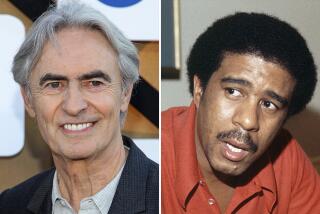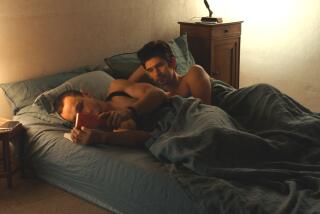NBC fuels decency debate
- Share via
While government regulators and social critics fumed about a breast that was exposed on the national airwaves, some in Hollywood were more concerned about another breast that wasn’t. This one belonged not to a pop superstar but to an 80-year-old actress playing an emergency room patient.
NBC’s decision to blur two shots of an elderly character’s breast from Thursday’s episode of “ER” -- over the strong objections of the show’s executive producer, John Wells -- was attributed to pressure from the network’s affiliates.
In its statement last week explaining the “ER” scene edit, the network said that it felt the particular shots were appropriate and in their proper context. But, alluding to the fallout from singer Janet Jackson briefly exposing her breast during the Super Bowl halftime show, the statement continued, “we have unfortunately concluded that the atmosphere created by this week’s events has made it too difficult for many of our affiliates to air this show.”
NBC’s decision stood out in a week marked by reprisals from the FCC, the NFL, CBS and others for Jackson and Justin Timberlake’s breast-revealing performance. It marked the point where the growing clamor over nudity, profanity and suggestiveness on TV and radio crossed over from live events to scripted programs -- typically a spot where storytelling context, ratings and later time slots justify what might otherwise raise hackles.
“This is a case when a rising tide threatens to capsize all boats,” said Steven Bochco, co-creator of “NYPD Blue,” the long-running ABC drama that has pushed broadcast limits in profanities and nudity throughout its 11 seasons on the air. “It is rather chilling and I hope it doesn’t slop over onto our show. That remains to be seen.”
For its part, NBC continues to stand by its choice.
“We feel comfortable with the decision we made last week given the circumstances,” said NBC senior vice president of publicity Rebecca Marks, referring to NBC affiliates’ fear of heightened sensitivities among local viewers. NBC chose to obscure the character’s breast even though NBC entertainment chief Jeff Zucker had been reluctant to go along, she said. Zucker was not available for comment.
Many in television’s creative community commiserated with “ER” producer Wells, who said “ ‘ER’s’ incidental exposure of the elderly woman’s breast in the context of a medical trauma is not comparable” to Jackson’s revealing ripped bodice, which he called “inappropriate and deplorable on a broadcast intended for viewers of all ages.”
“John is absolutely right to be outraged,” Bochco said. “It inappropriately tars him and by extension me and anybody who’s doing serious, thoughtful drama with the same brush.”
“ ‘ER’ has a 10-year record of quality and responsibility and truly anyone who’s watched the show should not be surprised to see the bare breast of a patient,” said David Nevins, president of Imagine Television, the production company responsible for such shows as “Arrested Development,” “24” and “Miss Match.”
“We have shown scenes in the past of exposed breasts,” Marks said. “Without having seen the actual shot, it would be hard for anyone to comment regarding this particular situation.”
Nevins and others, however, said they had rarely -- if ever -- experienced similar censorship.
Anthony Zuiker, creator of “CSI: Crime Scene Investigation,” which has been labeled one of the most objectionable shows on television by the Parents’ Television Council, said CBS chairman Leslie Moonves has only twice disapproved of certain scenes since the show premiered in 2000. “In an incident a couple of years ago, a woman was dead in a sandbox. We had three nipple shots. Mr. Moonves suggested we use two out of the three,” he said.
“In the context of forensic science,” he said, “it’s our job to push the envelope at all times. It’s the network’s job to see if it’s appropriate.”
Zuiker said the Super Bowl incident is “on our radar. But it has not in any way, shape or form changed our game plan.... We’re not going to be defensive in our creative abilities because of current events.”
Hollywood insiders blamed election-year politics, corporate consolidation, a preoccupation with youthful viewers and the expanding number of channels on television for what Bochco called NBC’s “hysterical overreaction.”
Most viewers watch NBC shows over affiliated local stations rather than network-owned stations such as those in Los Angeles and New York. Affiliates tend to carry the risk since the FCC has jurisdiction over licensees rather than networks, noted Roger Ogden, chairman of the NBC Affiliates Board and president of KUSA in Denver.
Ogden said board members had previewed the “ER” scene in January, weeks before the Super Bowl, and had mixed reactions as to whether it would provoke negative backlash in the local communities.
After the Super Bowl, he said board members’ opinions changed. “It just was the inappropriate time for NBC to proceed with that scene. If they had, there would have been very significant negative reaction on the part of a substantial number of viewers in most of our markets,” Ogden said.
Adding to affiliates’ concerns are ongoing congressional hearings into indecent programming and proposed hikes in fines. The next round is Wednesday, when committees in the House of Representatives and the Senate are holding simultaneous hearings in which they plan to hear from representatives from the networks and others.
Answering a request made to all major networks, NBC last week sent a letter to the House Committee on Energy and Commerce clarifying its policies and positions on proposed indecency regulations. The letter defended the use of the F-word -- which U2’s Bono used at last year’s Golden Globes -- in “serious and critically acclaimed theatrical or similar presentations” such as the movie “Saving Private Ryan.”
But it also said, “NBC fully supports the current legislative proposal” to increase the maximum fine the FCC can assess stations that repeatedly or flagrantly violate regulations.
Typically, fines for obscenity are levied against the stations that air the shows, rather than networks or corporate parents, which helps explain the nervousness on the part of the affiliates. The maximum fine for each finding of indecency is $27,500, and in the unlikely event all of CBS’ affiliates would be fined for airing the Super Bowl show, it would total around $5 million.
Over the past decade, taboos in nudity and language that were broken by pay cable programs have rapidly seeped into basic cable and broadcast shows. One of the first to try it was “NYPD Blue.” When it premiered in 1993, Bochco said, he reached an unusually liberal agreement with ABC over nudity and language that would be allowed in the show.
“My pitch to ABC was, if we want to reinvigorate the hour form, we have to compete with cable,” he said. “It really was a risk worth taking. Because we succeeded, we opened the floodgates to a new generation of infinitely better, more contemporary, more adult-oriented hour dramas,” he said.
In a previously planned effort to explore the issues, Fox on Thursday held a seminar of government regulators, academics, producers, parents and teens for scores of employees. The panel was shown clips from various live and scripted programs, including the Super Bowl halftime show, said one Fox employee. Parents and teens were less bothered by the exposed breast than by a clip from “The Sopranos” in which a woman shoots a man who had beaten her.
“If in fact everyone was as outraged as the politicians are saying, it wasn’t evident in this panel,” he said.
Over the weekend, directors and writers expressed more support for freedom of expression.
At Saturday’s Directors Guild of America awards ceremony, director Jeremy Kagan got a loud ovation when, during his speech accepting an honorary award, he denounced the current national sentiment in which “a breast has become a weapon of mass destruction.”
The Writers Guild of America, West, said in a statement that the guild supports freedom of expression -- not just for the sake of that expression but for the greater good of understanding.
“The split-second baring of one 80-year-old woman’s breast would have depicted the realism of the emergency room. If that realism had led just one woman to her doctor sooner -- the greater good would have been well served,” the statement said.
Despite the current cold climate, many believe the domino-style toppling of taboos on television is unstoppable. “The culture as a whole is moving inexorably toward more diversity, more different points of view and a fracturing of traditional mores,” Nevins said. “What was fringe eventually moves toward mainstream.”
More to Read
The biggest entertainment stories
Get our big stories about Hollywood, film, television, music, arts, culture and more right in your inbox as soon as they publish.
You may occasionally receive promotional content from the Los Angeles Times.










